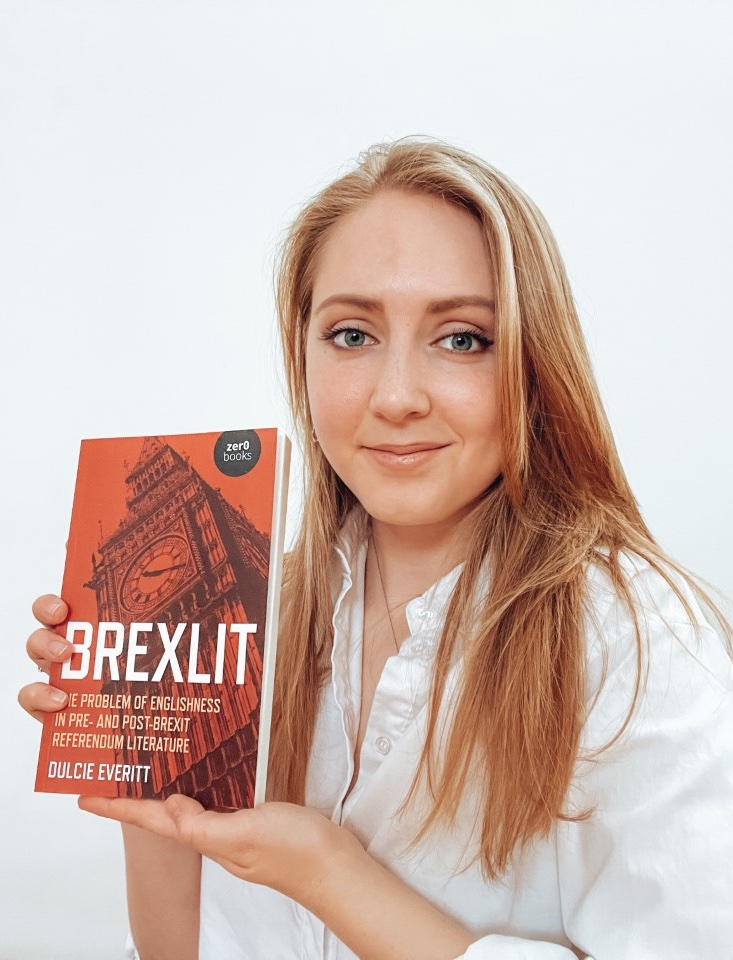By Audra Nemirow
Since Dulcie Everitt (ΦBK, Connecticut College) grew up in London, England, far away from the traditions of American higher education, her Phi Beta Kappa invitation came as a pleasant surprise. “I remember getting the email around April my senior year, so that was just after the first lockdown, and it was a really wonderful surprise,” Everitt said. “I read about the history of Phi Beta Kappa, and just felt really privileged and grateful to be a part of it. Our induction took place over Zoom, but the college made a real effort to make it feel special for us.”
But even before Everitt had ever heard of Phi Beta Kappa, she held the same values, such as a deep love of a well-rounded education. Her choice to study in the United States, for example, came from a desire to immerse herself in a more interdisciplinary setting. At Connecticut College, Everitt studied English, philosophy, and government and was able to continue her career as a competitive swimmer.
“In the U.K., you decide your department and spend three or four years of university studying one subject, which works for lots of people,” Everitt said. “But I felt I wanted somewhere that allowed me to take an interdisciplinary approach, so I became really interested in the liberal arts. I visited [Connecticut College], and I felt like it really combined the amazing liberal arts education and the opportunity to compete at a high level in my sport.”
The supportive environment at Connecticut College was necessary in the writing process of Everitt’s BrexLit: The Problem of Englishness in Pre- and Post-Brexit Referendum Literature. The book, which started out as a highly ambitious undergraduate thesis, discusses the development of English nationalism and identity in the age of Brexit. Everitt analyzes literature, history, and politics to create a comprehensive, reflective book with the goal of understanding how BrexLit characterizes what it means to be English. “At its heart,” Everitt said, “BrexLit is about how literature responds to the current political-cultural moment and how we might then in turn react to the literature.”
“I read a book published a few months after the referendum in 2016 called Autumn by Ali Smith,” Everitt said, “and it was quickly obvious that it had been written in response to the vote . . . Three years later, when I started thinking about my senior thesis topic, I looked closer into post-Brexit referendum literature and found the genre of ‘Brexlit’ as it was coined by The Financial Times. I felt really drawn to the topic, having read Autumn, but also as a way of examining how literature reacts to moments of political turmoil, what we can take away from such an immediate reckoning with the Brexit vote.”
Everitt was interested in the Brexlit for scholarly reasons, especially since few people had written about Brexit from an academic perspective at the time of her research. But Everitt’s personal experiences also played a large role in her approach.
“I was eighteen and still living in London at the time of the Brexit referendum,” Everitt said. “And I witnessed the polarization and the violence that stemmed from the campaign trail. Politics had really been injected into my life in a way they hadn’t before, and so I became very engaged with it.”
This personal experience included her time studying in the United States, which gave her a special perspective in the aftermath of the referendum. Finding that a lot of the same political experiences and emotions were apparent on both sides of the Atlantic, Everitt had “a real reckoning with what it means to be English or American respectively,” she recalled.
“I realized that I didn’t really know what [Englishness] meant,” Everitt said. “It turns out that Englishness is, in fact, quite an amorphous and problematic identity.”
BrexLit: The Problem of Englishness in Pre- and Post-Brexit Referendum Literature is part of an ongoing conversation, one that Everitt wants to continue to be a part of. But before she works on anything new, she wants to take a moment to reflect on the work she has already done. For now, her hope is that the book will spark conversations about how literature reacts to moments of political upheaval.
“The goal of the book is not to be definitive or serve as a lecture on how to read Brexlit,” Everitt said. “And one of the best things about studying literature is that we can draw our own conclusions, which is what I encourage readers to do.”
No matter what Everitt does next, she knows that her liberal arts and sciences education will continue to be an important part of her life. “I think that a liberal arts and sciences education allows you to look at the world through a number of different lenses,” Everitt said. “While being experts in our field is important, the ability to take classes across a range of disciplines leads us to think more critically and become more well-rounded individuals. I find myself using that interdisciplinary lens in my everyday life, whether I’m at work or reading the news or communicating with others. It also helped me massively when writing my book . . . It was in the English department, but was really an interdisciplinary project across English literature, government, art history, and more.”
BrexLit: The Problem of Englishness in Pre- and Post-Brexit Referendum Literature was published in January 2022 by Zero Books, an imprint of John Hunt Publishing.
Audra Nemirow is a senior at Hofstra University, where she is majoring in film studies and production. She was inducted into Phi Beta Kappa there in May 2021. Hofstra University is home to the Omega of New York chapter of Phi Beta Kappa.




